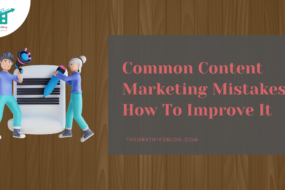
In today’s fast-paced digital realm, where smartphones have become extensions of our beings, the significance of mobile content marketing cannot be overstated. As the world increasingly shifts towards mobile-centric lifestyles, Businesses must adapt their marketing approaches to effectively attract consumers in the space where they primarily reside: on their mobile devices.
In this comprehensive guide, we delve deep into mobile content marketing, exploring its definition, importance, and strategies for successfully capturing the attention of the ever-connected mobile audience.
Join us as we uncover the secrets to Harnessing mobile devices’ capabilities to propel engagement, conversions, and business success.
What Is Mobile Content Marketing?
Mobile content marketing refers to creating and distributing marketing content tailored explicitly for consumption on mobile devices such as smartphones and tablets.
It encompasses various forms of content, including articles, videos, images, infographics, social media posts, and more, and is optimized to be easily accessible and engaging on mobile screens.
Mobile content marketing aims to reach and engage with mobile users effectively. It delivers valuable and relevant content that resonates with their preferences, behaviors and needs while driving desired actions such as brand awareness, customer acquisition, and sales.
Critical Components Of Mobile Content Marketing

- Mobile-Optimized Content: Ensuring all content, including text, images, and videos, is optimized for mobile devices. This involves using responsive design, fast-loading media, and effortless navigation to ensure a smooth user experience across different screen sizes.
- Mobile-Friendly Website: This includes optimizing page load times, simplifying navigation, and implementing mobile-friendly features like click-to-call buttons and location-based services.
- Appropriate Content Formats: Choose formats suitable for mobile consumption, such as short-form videos, infographics, and interactive elements. Mobile users prefer snackable content that can be easily consumed on the go.
- Localization: This involves customizing content to suit the preferences and requirements of mobile users in particular geographic areas. This may encompass translating content into various languages, integrating regional cultural elements, and optimizing for localized search terms.
- Mobile SEO: This involves optimizing content for search engines to ensure visibility and discoverability on mobile devices. This is done using mobile-friendly keywords, optimizing meta tags, and improving page load times for better search engine rankings.
Now that we understand mobile content marketing and its essential components let’s know why mobile-optimized content matters.
Why Mobile-Optimized Content Matters?
Mobile-optimized content matters for several compelling reasons in today’s digital landscape:
- Mobile Dominance: Considering the extensive usage of smartphones and tablets, Mobile devices now serve as the predominant method for accessing the internet among a significant portion of the population, with mobile traffic surpassing desktop usage in numerous regions. This makes it crucial for businesses to cater to mobile users with optimized content.
- User Experience: Mobile users expect fast-loading, easy-to-navigate websites and content. Mobile-optimized content ensures a positive user experience by adapting to different screen sizes and resolutions, improving readability, and providing seamless navigation. A subpar mobile expertise can result in elevated bounce rates and potential customer loss.
- Search Engine Rankings: Search engines like Google prioritize websites optimized for mobile devices in their search results, particularly for users searching on mobile devices. Optimizing for mobile is an essential element of search engine optimization (SEO), and mobile-friendly websites may need higher rankings and reduced organic traffic.
- Increased Engagement: Mobile-optimized content is more likely to Attract and maintain the engagement of mobile users. Visual appealing content that is easy to consume and optimized for mobile viewing formats, such as vertical videos and short-form content, can lead to increased engagement rates and longer durations spent on the site.
- Social Sharing: Mobile-optimized content is more conducive to social sharing and virality on social media platforms. Considering that most social media users use mobile devices to access platforms, content optimized for mobile viewing is more likely to be shared, liked, and commented on, amplifying its reach and impact.
- Brand Reputation: A well-optimized mobile experience reflects positively on a brand’s reputation and credibility. Conversely, a poor mobile experience can damage a brand’s reputation and negatively affect user perceptions.
Now, let’s delve into the practical solution: developing a strategy for crafting impactful mobile content marketing. We’ll then explore upcoming trends in the field.
Strategies For Effective Mobile Content Marketing

Creating Mobile-Friendly Content
- Importance of Responsive Design: Responsive design ensures that your website and content adapt to various screen sizes and resolutions, providing a consistent and user-friendly experience across devices. That is crucial as users increasingly access content from smartphones and tablets with different screen dimensions. Responsive design enhances usability and improves SEO, as Google prioritizes mobile-friendly websites in search results.
- Optimizing Content for Mobile Platforms: Beyond responsive design, optimizing content for mobile platforms involves considerations such as load times, readability, and navigation. Mobile users have limited attention spans and patience, so it’s essential to streamline content, use concise language, and incorporate clear calls to action. Optimizing images and videos for mobile consumption can also improve user engagement and satisfaction.
Leverage Social Media For Mobile Content Distribution
- Choosing the Right Social Media Platforms: Gaining insight into your target demographic and their preferred social media platforms is critical to effective mobile content distribution. Various platforms appeal to different demographics and interests; thus, select those where your audience engages the most. For instance, younger demographics favor platforms like Instagram and TikTok, while professionals might engage more on LinkedIn.
- Tailoring Content for Social Media Consumption on Mobile Devices: Social media users primarily access platforms via mobile devices, so it’s essential to tailor your content for mobile consumption. This includes eye-catching visuals, concise captions, and mobile-friendly formats like vertical videos and carousel posts. Additionally, leveraging features such as Stories and live video can enhance engagement on mobile social media platforms.
Incorporating Video And Visual Content
- Rise of Video Consumption on Mobile Devices: Video content has experienced exponential growth in popularity on mobile devices, with platforms like YouTube and TikTok driving this trend. Mobile users prefer visual content due to its ease of consumption and entertainment value. Incorporating video into your mobile content marketing strategy can help capture and retain audience attention, increase engagement, and convey your message more effectively.
- Tips for Creating Engaging Video Content for Mobile Users: When creating video content for mobile users, keep it short, captivating, and visually appealing. Start with a hook to grab attention within the first few seconds, optimize for sound-off viewing with subtitles or captions, and ensure compatibility with vertical viewing orientation. Interactive elements like polls and quizzes can enhance user engagement with mobile video content.
Utilizing Mobile-Focused SEO Techniques
- Importance of Local SEO for Mobile Content: Local SEO is critical for businesses targeting mobile users, as many mobile searches have local intent. Optimizing your content for local search queries, including location-based keywords and creating Google My Business listings, Enhancing prominence in search results on mobile devices can hold particular significance for physical retail businesses that aim to attract nearby customers.
- Mobile Keyword Research and Optimization: Conducting keyword research specific to mobile search queries and optimizing content accordingly can enhance your visibility in mobile search results. Concentrate on extended keyword phrases and conversational language that mobile users will likely use when searching. Optimizing meta tags, headings, and content structure for mobile-friendly readability can improve your chances of ranking higher in mobile search results pages.
Future Trends In Mobile Content Marketing

Emerging Technologies Shaping Mobile Content Marketing
Cutting-edge technologies such as augmented reality, virtual reality, and artificial intelligence (AI) are poised to transform mobile content marketing. Let’s explore their impact.
Augmented Reality (AR) And Virtual Reality (VR)
These are revolutionizing mobile content marketing by offering immersive experiences. AR enables brands to superimpose digital content onto the physical world, enhancing user engagement and interaction.
Conversely, VR transports users to entirely virtual environments, providing them with fully immersive experiences. These technologies captivate users’ attention, allowing brands to create memorable and impactful content that drives deeper connections with their audiences.
Artificial Intelligence (AI)
This is another game-changer in mobile content marketing. AI-powered chatbots and voice assistants deliver personalized recommendations and real-time assistance, enhancing user experience and engagement.
By leveraging AI, brands can provide tailored content and offerings to cater to their audience’s preferences and requirements. This level of personalization fosters stronger connections between brands and consumers, ultimately driving loyalty and conversion rates in the mobile space.
Predictions For The Future Of Mobile Content Consumption
The future of mobile content consumption will be characterized by increased personalization, interactivity, and multi-channel experiences. Short-form video content, live streaming, and interactive storytelling will continue to dominate mobile platforms as consumers seek quick, entertaining, and shareable content.
With the introduction of 5G technology, mobile device users will have faster internet speeds, enabling seamless streaming of high-quality multimedia content. Furthermore, incorporating augmented reality (AR) and virtual reality (VR) into mobile apps will offer Engaging encounters that blend the boundaries between virtual and real worlds. Mobile content consumption will evolve to cater to diverse preferences and behaviors as mobile devices become more integral to daily life.
Strategies To Stay Ahead In Mobile Content Marketing
To stay ahead in mobile content marketing, brands must deliver relevant, valuable, and engaging content experiences across multiple channels and devices. Investing in emerging technologies such as AR, VR, and AI can help brands create immersive and personalized mobile experiences that resonate with their audiences.
Additionally, optimizing content for mobile-first indexing and ensuring fast load times are essential for improving user experience and search engine visibility. Brands should also leverage data analytics to understand user behavior and preferences, enabling them to tailor content strategies accordingly. By adopting a proactive approach, embracing innovation, and prioritizing user experience, brands can effectively stay ahead in the ever-evolving landscape of mobile content marketing.
Conclusion
Now that you’ve understood mobile content marketing, you’re equipped with the knowledge to engage with audiences on their preferred devices effectively. By implementing strategies tailored to mobile platforms, optimizing for user experience, and staying abreast of emerging trends, you can align your brand for success in the dynamic digital marketing landscape.
As mobile continues to dominate online interactions, embracing mobile content marketing is essential for staying relevant and competitive in today’s ever-evolving digital world.
However, if you still have any questions related to the blog, please feel free to leave them in the comment section below. We will be happy to answer them.
Thanks for reading 🙂








No Comments